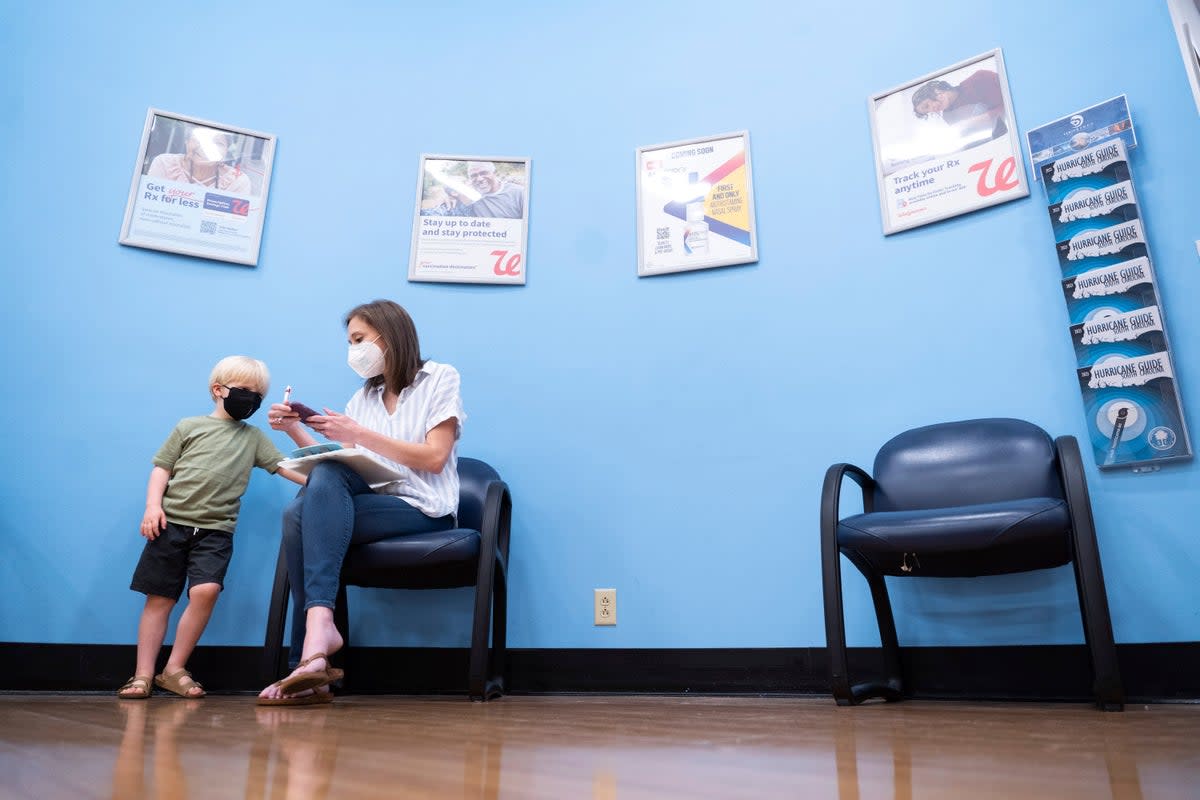Voices: Covid infections are falling. Democrats should be talking about that more

- Oops!Something went wrong.Please try again later.
Covid case rates are down. You’d think that would be good news for Joe Biden and the Democrats in the last couple of months before the midterm elections. But while the party has been quick to tout lower gas prices and inflation, better Covid numbers have largely been ignored. The refusal to even cheer for a mild improvement in the pandemic is a bleak indication of how completely policymakers have embraced bipartisan surrender to the virus.
Experts were very concerned that the Omicron variant would result in a massive spike over this summer. Numbers did in fact rise decisively from a low in March of about 28,000 cases a day in the seven-day rolling average to a high of about 130,000 cases a day in mid-July. The worry was that we’d see a continued rise to pass the second-largest spike in December 2020, which hit 247,000 cases a day.
But instead, the wave seems to be receding, at least for the moment. Numbers have dwindled to about 75,000 a day in the seven-day average currently, or 204 confirmed cases per million people. NBC News says cases have fallen 23% in the last two weeks.
That’s still a lot of people getting sick, and deaths have been slower to come down, hovering between 450 and 500 a day in the seven-day average throughout August. Even there, though there are signs of hope; on Sept 7 the seven-day average of deaths per day fell before 400 for the first time since early July.
Four-hundred people dying a day, every day, day in and day out is bleak; it’s basically the equivalent of a 9/11 every week. But the fact that Omicron turned out to be less horrific than it could have, and the downward trend, are certainly reason for at least limited relief. You’d think political leaders would want to take credit, especially going into the midterms.
Biden, though, has been leery of talking about the drop. In a tweet before Labor Day, he boasted that “Wages are up, gas prices are down, and people are back at work.” Covid falling is certainly relevant to people being able to get to their jobs and enjoy their weekend. But Biden made no mention of it.
That’s in line with national Democratic messaging, which has largely avoided mention of the receding wave. The WHO has reported on numbers falling internationally, and states and localities have used the reduction to remove their few remaining safety measures or gut data tracking capabilities. But while the administration speaks in general about its success in weathering the virus and getting things back to normal, there’s little effort to claim credit for the latest drop in cases.
It’s possible the Democrats are worried that Covid cases will spike again. But gas prices could spike too, and that hasn’t stopped Democrats from claiming credit for getting prices under control.
The real problem is that the administration messaging is devoted to assuring people that the pandemic is not a problem. “We are thankfully at the point where COVID does not rule our lives today” an administration official told NBC. That’s the standard line, despite the fact that Covid continues to have a major, brutal impact on the lives of many vulnerable people.
According to the CDC, one in five American adults continue to have symptoms of “Long Covid”, which can include persistent fatigue, shortness of breath, and brain fog affecting thinking and memory, as well as long-term heart problems. Immunocompromised people at high risk of Covid still face major restrictions on their lives, especially as the rest of the country abandons even minimal safety precautions like masks. And, of course, and again, hundreds of people are still dying every day. Covid does not rule their lives any more because they are dead.
Were the White House to boast that Covid numbers are coming down, it would be an admission that high Covid numbers are actually bad, and have a real human costs. No one wants to say that things are (a bit) better, because they don’t want to acknowledge they were worse. And they really don’t want to acknowledge that they have an important obligation to do everything they can to improve things further.
Instead, the administration is busy ratcheting back Covid precautions for schools, backing away from masking recommendations, and planning how to set up a commercial market in vaccines when the government stops delivering them. The administration is no longer trying to eliminate the virus; it’s trying to get people used to living with it, seemingly forever.
The government is still making some efforts to control the virus. Biden today is making a plea to the public to get bivalent booster shots that are effective against the Omicron variant. He’s seeking $22.4 billion from Congress to restart a free testing kit program and prepare for a potential fall surge. For all that they insist that we have reached a stable, livable Covid status quo, it’s clear that the administration knows that the crisis is ongoing. They just want to be quiet about it.
It’s difficult to fight a massive pandemic when you don’t want to talk about how successful or unsuccessful current efforts are to fight the massive pandemic though. Republicans, for example, are currently blocking that Covid funding, as they’ve been doing for months. Democrats aren’t campaigning on the need for further Covid interventions, however, and so the GOP has little impetus to move.
When confronted with a pandemic, leaders often downplay or lie about bad news in an effort to avoid blame. That’s horribly predictable. What’s more surprising is when leaders avoid talking about good news. But we’re at the point in the pandemic where officials don’t want to even discuss improvements, lest the public be reminded that there is, in fact something that needs improving.

